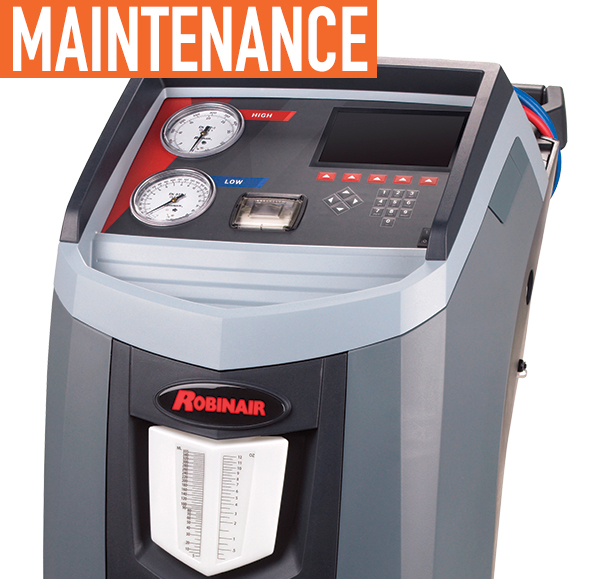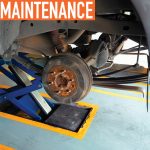A variety of units and refrigerants makes servicing heavy-duty air conditioning systems complicated and challenging. To help troubleshoot the manual recognition of each operating system, shops rely on A/C machines to get a unit running properly and resolve customer concerns.
A quality A/C machine should combine ease of use and superior accuracy to recover, recycle, evacuate, leak test, and recharge a vehicle’s system quickly and accurately. Selecting the correct A/C machine can help technicians be more efficient.
FLUID EXCHANGE
Understanding fluid exchange in a heavy-duty truck requires technicians to take a closer look at the process of recovering, recycling, and recharging refrigerant. Machines that address this process, such as the lineup of Robinair products, are capable of pulling refrigerant out of the unit, evacuating the system, and replacing recovered refrigerant.
The process begins with recovery, as technicians offload refrigerant from an A/C system that needs to be assessed. In the recycling phase, contaminants are filtered out of the refrigerant as it is transferred to a reserve tank. Once the system is cleared out and a technician can complete repair work as necessary, the recharging process begins and the system pulls processed refrigerant out of the storage tank. The technician will also need to put new oil into the system in order to keep the compressor running properly. Technicians should make sure they know how much oil was removed from the system in order to replace it with the same amount.
Working with heavy-duty trucks, technicians must be precise as they recharge A/C systems. As trucks are becoming more and more efficient, the A/C systems are smaller and allow for less refrigerant. So, being off in charge amounts could lead to too little refrigerant and the truck not cooling enough or degradation in the system.
A/C MAINTENANCE TIPS
For technicians working on heavy-duty trucks that require A/C maintenance, there are a few preliminary tips to help ensure a proper fluid exchange process:
- First, begin with a thorough visual inspection of the system and components that can be easily seen, including access doors and under the hood. It’s important to look for oil spots or anything that could indicate a leak or buildup.
- For any projects that require refrigerant recovery, it is essential that technicians make sure there is enough open capacity in their machine to pull all refrigerant out of the system. Using a machine with an internal/external tank that is already full of refrigerant will not allow for a proper recovery.
- When putting new oil into a system, technicians must follow manufacturer recommendations to guarantee proper viscosity and capability of the oil.
MOBILE A/C MACHINE
In selecting an A/C machine to recover, recycle, and recharge, there are application-specific options from which to choose. For shops that focus on heavy-duty trucks with system capacities beyond 18 lbs, the Robinair 17800B would be appropriate. This machine is ideal for vehicles that use more than one refrigerant, as well as fleet maintenance, as it has both R-12 and R-134a capabilities.
Shops that focus on highway trucks or diesel engines with a system capacity of 15 to 18 lbs should consider a machine that is capable of servicing passenger vehicles. For this application, the Robinair 34988NI can assist techs as they recover, recycle, evacuate, leak-test, and recharge R-134a with an industry-leading 98.5% recovery and automatic functions.
To save time and increase efficiencies, Robinair also offers manuals for purchase. The manuals cover different types of A/C systems and provide the proper amount of oil and refrigerant to fill them.
DIAGNOSTIC CAPABILITIES
These machines can also offer diagnostic capabilities for A/C units indicated by gauges to test system pressure. Technicians can hook up the machine to the unit connection ports and, by using pressure readings, can gather an indication as a means of diagnosing the system. Referring to service manuals, the correct pressure amount will be the same between the two to ensure a properly operating system.
These diagnostic capabilities can also translate to additional business for shops. While completing routine service checks on trucks, technicians should consider recommending maintenance of A/C units on a regular basis. Using an A/C machine can ensure proper cabin temperature while checking for any leaks or other system issues.

NEW TECHNOLOGY
Though passenger vehicles equipped with R-1234yf are beginning to hit the roads, heavy-duty trucks are not immediately affected by the change. For the foreseeable future, heavy-duty trucks will continue to operate only on 134a refrigerant and, as a result, technicians need to be sure they are up to speed on the technology based on the applications they see in their shop. Recovering, recycling, and recharging each of the two types of refrigerant on the road today requires different types of machines.
Overall in the industry, there is an ongoing trend in innovation for dual purpose machines that can process both 1234yf and 134a, which would eliminate the need for shops that service both heavy-duty trucks and 1234yf vehicles to invest in two separate machines.
Because the EPA has not currently allowed 1234yf to be used in heavy-duty trucks, this innovation could be something for heavy-duty shops to keep an eye out for in the future, if they service both applications.
CERTIFICATION
In order to repair or service mobile A/C units, technicians must be trained and EPA Section 609 certified, which has been an industry standard for many years. As the prevalence of 1234yf grows, new coursework has been created for technicians to understand and be trained to work on systems and machines using the new refrigerant. Those who are already EPA 609 certified are automatically grandfathered in and do not need to be re-certified under the new material.
FOR MORE INFORMATION:
Find out more about Robinair machines, visit www.robinair.com/automotive.
_______________________________________________________________________
MODERN WORKTRUCK SOLUTIONS: OCTOBER 2016 ISSUE
Did you enjoy this article?
Subscribe to the FREE Digital Edition of Modern WorkTruck Solutions magazine.
![]()




